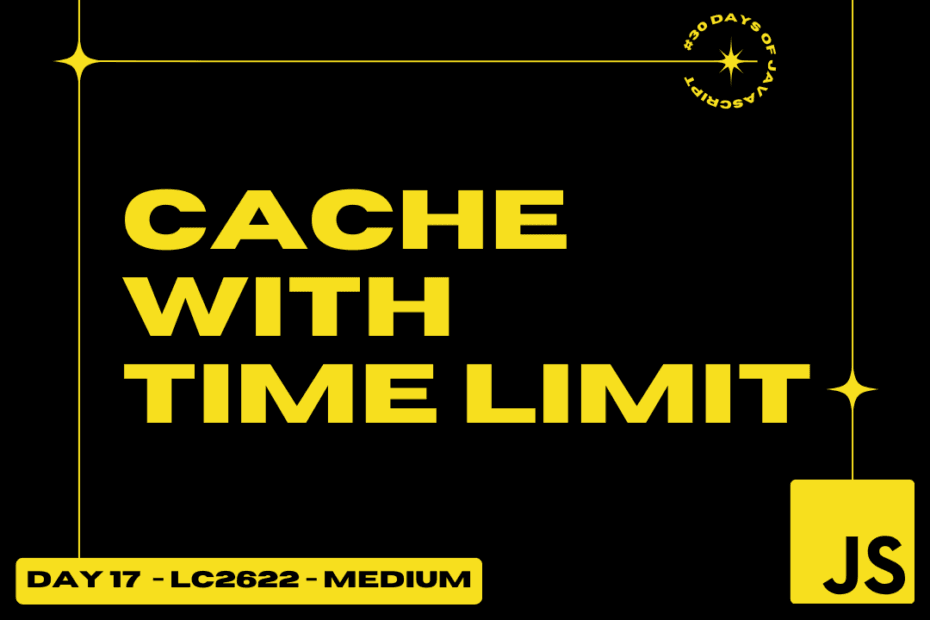🔗LC2622 🟡 Medium 🧩 Pattern – Promises and Time, Map
📅 Day 17/30 Days of JavaScript
Write a class that allows getting and setting key-value pairs, however a time until expiration is associated with each key.
The class has three public methods:
set(key, value, duration): accepts an integer key, an integer value, and a duration in milliseconds. Once the duration has elapsed, the key should be inaccessible. The method should return true if the same un-expired key already exists and false otherwise. Both the value and duration should be overwritten if the key already exists.
get(key): if an un-expired key exists, it should return the associated value. Otherwise it should return -1.
count(): returns the count of un-expired keys.
Example
Input:
actions = ["TimeLimitedCache", "set", "get", "count", "get"]
values = [[], [1, 42, 100], [1], [], [1]]
timeDelays = [0, 0, 50, 50, 150]
Output: [null, false, 42, 1, -1]
Explanation:
At t=0, the cache is constructed.
At t=0, a key-value pair (1: 42) is added with a time limit of 100ms. The value doesn't exist so false is returned.
At t=50, key=1 is requested and the value of 42 is returned.
At t=50, count() is called and there is one active key in the cache.
At t=100, key=1 expires.
At t=150, get(1) is called but -1 is returned because the cache is empty.Solutions
I have solved this problem in three ways.
- Using Object to store key, value pairs
- Map data structure – map has inbuilt methods to manage keys
- Class with methods to solve the same
Solution using Object
var TimeLimitedCache = function () {
this.cache = {};
};
/**
* @param {number} key
* @param {number} value
* @param {number} duration time until expiration in ms
* @return {boolean} if un-expired key already existed
*/
TimeLimitedCache.prototype.set = function (key, value, duration) {
const cache = this.cache
const existingKey = cache[key];
if (existingKey) {
clearTimeout(existingKey.timeoutId);
}
const timeoutId = setTimeout(() => delete cache[key], duration)
cache[key] = {
value,
timeoutId
};
return !!existingKey;
};
/**
* @param {number} key
* @return {number} value associated with key
*/
TimeLimitedCache.prototype.get = function (key) {
const entry = this.cache[key];
return entry ? entry.value : -1;
};
/**
* @return {number} count of non-expired keys
*/
TimeLimitedCache.prototype.count = function () {
return Object.keys(this.cache).length
};
/**
* const timeLimitedCache = new TimeLimitedCache()
* timeLimitedCache.set(1, 42, 1000); // false
* timeLimitedCache.get(1) // 42
* timeLimitedCache.count() // 1
*/Solution using Map
var TimeLimitedCache = function () {
this.cache = new Map();
};
/** * @param {number} key
* @param {number} value
* @param {number} duration time until expiration in ms
* @return {boolean} if un-expired key already existed
*/
TimeLimitedCache.prototype.set = function (key, value, duration) {
const cache = this.cache;
const existingEntry = cache.has(key);
if (existingEntry) {
clearTimeout(cache.get(key).timeoutId);
}
const timeoutId = setTimeout(() => cache.delete(key), duration);
cache.set(key, { value, timeoutId });
return existingEntry;
};
/** * @param {number} key
* @return {number} value associated with key
*/
TimeLimitedCache.prototype.get = function (key) {
const entry = this.cache.get(key);
return entry ? entry.value : -1;
};
/** * @return {number} count of non-expired keys
*/
TimeLimitedCache.prototype.count = function () {
return this.cache.size;
};Solution using Class
class TimeLimitedCache {
constructor() {
this.cache = new Map();
}
/**
* @param {number} key
* @param {number} value
* @param {number} duration time until expiration in ms
* @return {boolean} if un-expired key already existed
*/
set(key, value, duration) {
const existingEntry = this.cache.has(key);
if (existingEntry) {
clearTimeout(this.cache.get(key).timeoutId);
}
const timeoutId = setTimeout(() => this.cache.delete(key), duration);
this.cache.set(key, { value, timeoutId });
return existingEntry;
}
/**
* @param {number} key
* @return {number} value associated with key
*/
get(key) {
const entry = this.cache.get(key);
return entry ? entry.value : -1;
}
/**
* @return {number} count of non-expired keys
*/
count() {
return this.cache.size;
}
}